“Treason is but trusted like the fox” - Shakespeare
Whatever Happened to Benedict Arnold?
By Mary Theobald
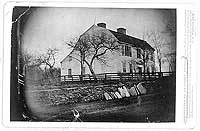
Hannah Arnold gave birth to her son in this Norwich, Connecticut home January 14, 1741. The boy was named Benedict, after his father.
This image has been substituted for one that accompanied this article in the summer, 2001 print issue of the Colonial Williamsburg Journal.
The kidnapping was set for December 11. It was a bold plan, but simple, and for those reasons likely to succeed. They would seize the traitor in the garden when he made his usual midnight visit to the necessary house, drag him unconscious "through the most unfrequented alleys" of New York City to the river where a small boat was hidden, then row silently across to soldiers waiting on the New Jersey shore. In the unlikely event that they were stopped before reaching the boat, they had a glib story ready about a drunken comrade and the guardhouse. Once in New Jersey, the traitor would swing from the end of a short rope while a crowd of soldiers cheered itself hoarse.
Sergeant Major John Champe, the young Virginian in charge, had been chosen for the mission by his commander, Major "Light Horse" Harry Lee, because he was "full of bone and muscle ...taciturn," and had "inflexible perseverance." A cavalryman, Champe was to pretend to desert to the English, "insinuate himself" with the traitor Benedict Arnold, and bring him back for execution. Assassination would have been easier, but General George Washington insisted Arnold "be brought to me alive. No circumstance whatever shall attain my consent to his being put to death...My aim is to make a public example of him."
Turncoat Major General Arnold was probably the best field commander on either side in the Revolution. His invasion of Canada, compared by contemporaries to Hannibal's crossing the Alps, had nearly succeeded in making that province the fourteenth state. Skillful and bold, he had won the Battle of Saratoga, reversing the Americans' losing streak and securing French assistance for Ambassador Benjamin Franklin. He also sustained a severe leg wound that, for a time, sidelined him to garrison duty, and gave him more time to brood on the under-appreciation of his brilliance.
But this talented American, so trusted by Washington that the British thought him incorruptible, had attempted to betray his country by surrendering West Point, the most strategic fort on New York's Hudson River. He had persuaded Washington to give him the command in 1780, and had plotted its fall in a dozen letters exchanged with Major John André, chief of British intelligence. For his treason, Arnold wanted money and a British major general's commission.
Arnold and André met September 21 near West Point to hammer out details. André could not, when they had done, get back to British-occupied New York by ship as planned. He traded his uniform for civilian garb, hid incriminating papers in his boot, and set off on horseback through American lines. Militiamen intent on robbery waylaid and searched him, and discovered the documents. The men turned him over to the nearest officer, who notified Arnold of the capture of a spy.
Arnold had only minutes to flee before Washington, due momentarily, would see the papers and discover the plot. He escaped with the clothes on his back, becoming the most infamous traitor in American history. André was tried for spying, convicted, and hanged.
"Arnold has betrayed me!" Washington told Lafayette. "Whom can we trust now?"
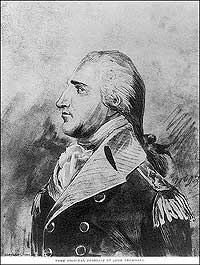
By 1776, Benedict Arnold's knack for strategy and bravery in battle had raised him to prominence among American Generals.
This image has been substituted for one that accompanied this article in the summer, 2001 print issue of the Colonial Williamsburg Journal.
In New York, he was interrogated and released with a letter of recommendation to Arnold, who was delighted to learn that this fine young man had followed his example. He offered, and Champe accepted, a place in Arnold's new American Legion.
Arnold had made his own dash to New York a month before. His defection was a coup for General Sir Henry Clinton, the British commander-in-chief. The information he provided the British on American forces—their financial straits, low morale, dwindling numbers, and capabilities—was valuable.
Arnold issued newspaper statements and proclamations to explain his action and to encourage imitation. Arnold and Clinton expected other high-ranking American officers to follow come in, and thought that the trickle of Loyalist volunteers would become a flood. But just forty desertions were attributed to his example. American soldiers might, and did, abandon their army in droves, but they did not go over to the other side.
Meanwhile, Arnold donned the British uniform of a brigadier general, bought a fine townhouse next to British headquarters for his young wife and their baby who soon joined him, and set about haggling over money—a lifelong pursuit.
Pretty, vivacious Margaret Shippen, known to all as Peggy, was seventeen when she met Arnold, a thirty-seven-year-old widower. The Shippens were wealthy Philadelphians with Loyalist leanings that they indulged when the British army captured the city in September 1777. When Continentals replaced the redcoats the following June, Arnold became the city's commander. The Shippens, and others, reined in their Tory sympathies, but Peggy and her sisters seemed happy to be courted by officers of either side. She and Arnold were married within months of their introduction.
Her circle of British friends had included Major André and it was probably she who united the men in the West Point plot. Peggy facilitated their exchange of letters—though her husband gallantly avowed her ignorance of his plans. Popular opinion holds Peggy the cause of Arnold's treason, suggesting her expensive tastes drove him so far into debt that selling out his country was his only option. But Arnold was in financial trouble long before their marriage, and there were other factors in his decision. Peggy is blamable, but she was a loyal and loving wife and mother who managed what her husband could not—after his death she paid off his debts.
Arnold formed his American Legion—it attracted 212 men, among them Champe—and bombarded Clinton with plans to retake Philadelphia and crush Washington. He chaffed for opportunity to win gold and glory. "A life of inaction will be prejudicial to my health," he told Clinton.
At length, Clinton ordered Arnold to take his Loyalists, along with several hundred Hessians and British regulars, and invade Virginia. Their mission: to destroy military supplies and prevent Old Dominion reinforcements from reaching General Nathanael Greene in the Carolinas where Greene was fighting Lieutenant General Charles, Lord Cornwallis.
Arnold ordered his men to board transport ships December 11, the night designated for his kidnapping. When Champe should have been dragging an unconscious traitor to the river's edge, he was stuck in the hold of a British vessel headed south. Lee and his dragoons waited all night on the Jersey shore for a rowboat that never came.
Washington had warned the governor of Virginia, Thomas Jefferson, of imminent invasion; nonetheless, Jefferson was ill-prepared and curiously doubtful of initial reports that British ships were sailing into the Chesapeake Bay. Arnold's fleet arrived in Hampton Roads on December 30, 1780. With a good wind, he ran up the James River and docked at Westover, the plantation of Mary Willing Byrd, the Loyalist-leaning widow of William Byrd III and Peggy Shippen Arnold's cousin. The British marched to Richmond—Virginia's capital since the government left Williamsburg the April before.
Jefferson called out the militia too late. The city was undefended. With time for little more than a last-ditch effort to cart away supplies and public records, the governor fled the morning of January 5. Arnold marched in at noon, "undisturbed by even a single shot."
He remained in Richmond fewer than twenty-four hours. From headquarters at Main Street's City Tavern, he sent Jefferson a message offering to spare the capital if Jefferson would allow him to remove stores, mostly tobacco, to British ships without molestation. Jefferson refused. Arnold plundered public buildings, burned warehouses, destroyed records, and looted dozens of ships full of tobacco, wine, and West Indian goods. Arnold said that he did not intend to destroy private buildings and merchandise, but a change in wind caused the flames to spread randomly.
Perhaps Virginia's greatest loss was the Westham cannon foundry and powder manufactory, six miles upriver. In Chesterfield, below the city, Arnold's men torched more buildings and military supplies and worked their way back down the James, burning and looting.
?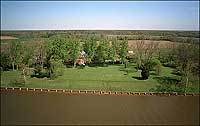
Westover plantation, a grand family estate, served as a landing site for a British fleet before an attack on Virginia's capital led by Benedict Arnold. From Westover, the British proceeded to Richmond and set the city ablaze.
Phillips, who outranked Arnold, took over. In April they raided up the James again. This time they encountered a little Virginia fleet at Osborne's about fifteen miles below Richmond. The invaders sank nine merchant vessels intended to help the French navy and captured a dozen others stuffed with cargo.
They destroyed a good deal of Manchester—the south side of today's Richmond, but then a separate town—Petersburg, and Chesterfield Court House. They skirmished with Lafayette—too outnumbered to give battle—and returned to Portsmouth, burning, looting, killing horses and cattle, and taking slaves.
Phillips fell ill with a fever at Petersburg and died May 13. A rumor spread that Arnold had poisoned him to regain command. It was nonsense—Arnold got along well with Phillips—but it reveals an animus for the American.
Arnold was disturbing. Though he had made the "right" decision by coming over to their side, betrayal made the British uncomfortable. Moreover, the prevailing view was that colonial birth and high command were mutually exclusive. British officers were by definition born gentlemen. Colonist Arnold had been a West Indies trader and an apothecary before the war. He did not merit his rank's distinction.
He added to his demerits an unseemly passion for prize money. Even those who admired him most were put off by his greed. "Keen, penetrating, enterprising, and courageous, he is perhaps better calculated than any in the army to carry on an offensive, predatory war," wrote a contemporary. "But his good qualities are obscured by the vices of habit and education. He sacrifices too much to avarice for a military man." Word spread that he had become "as rich as a nabob, with the plunder of Virginia."
Admiral George Rodney had reported to London. "Believe me, my Lord, this man Arnold ...will do more towards the suppressing the rebellion than all our generals put together." Nevertheless, he said, "Jealousy ...will prevent Arnold being long employed to advantage."
Clinton admired Arnold's abilities and senior officers were courteous, but "the subaltern officers refused to serve under his command," wrote one. Clinton secretly ordered two lieutenant colonels he placed under Arnold to take command in the event of Arnold's death or "incapacity" in Virginia.
Arnold neither died nor proved incapable. On the contrary, General Phillips had reported to Clinton from Portsmouth on "the ability, activity, and zeal of Brigadier General Arnold, who with a small corps of troops effected a very essential service up the James River" and "has sustained a rather weak post here and carried on a variety of objects with great success."
He remained in charge of Britain's Virginia forces for a week before Cornwallis arrived May 20 to merge armies and set the stage for the British defeat at Yorktown.
General Clinton recalled Arnold to New York in June. Before Arnold left, he had advised Cornwallis to make his permanent base in Richmond and not to get trapped in Yorktown. About this time, the would-be kidnapper Champe skedaddled back to the Continental Army where Washington greeted him warmly.
In New York, Arnold fretted again in inactivity. He bombarded Clinton with proposals to attack West Point, Philadelphia, or New London, Connecticut, a privateering base. He wrote over Clinton's head to London.
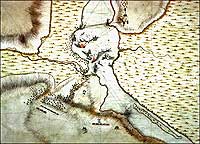
A depiction of the destruction of a small Virginia fleet at Osborne's, just below Richmond. The scene was drawn by Colonel John Simcoe, who fought alongside General Arnold.
In September, Clinton sent Arnold to New London. Hundreds of captured British ships laden with cargo had been sailed into the port to be sold by the sea captains who played this dangerous game. Arnold knew the area and its inhabitants well. He was born a dozen miles away.
On September 4, he took the town by surprise and effortlessly. He ordered civilian property spared and sent several hundred men to attack Fort Griswold, the town's main defense. Arnold thought the stronghold lightly fortified. When he learned otherwise, he ordered a withdrawal and set about destroying military objectives and attempting, without much success, to confine looting to warehouses and public buildings.
The withdrawal order reached Fort Griswold after the assault began. His Majesty's troops suffered horrific casualties. When they breached the fort's walls, they disregarded the surrender of the American militia inside. Most of the rebels they massacred.
In town, a gunpowder-laden shop accidentally exploded, the wind changed, and much of New London burned. The town lost 151 buildings, huge amounts of trade goods, many cannon, most of its shipping, and 113 Fort Griswold defenders killed or wounded. The British casualty rate was among the war's highest.
It was useless for Arnold to protest that he was not responsible. He was in command. That he had ravaged his home town was, for the Americans, an enormity, the wind shifting excuse was old, and word was that Arnold had once more returned to New York richer than he left.
News of Cornwallis's defeat reached New York in late October. Arnold did not share the prevailing view that the war was lost. He was determined to get to London to persuade his superiors to give Clinton's command to him and let a real general finish the fight. In December, he sailed for England in a convoy of 150 ships. His wife and their children were on one, he and Cornwallis on another.
The Arnolds were warmly received. Clinton, who had kindly asked a London friend to show them hospitality, received this report: "She was well dressed and had an ease in her behavior which astonished everybody, and novelty made everybody desirous of being presented to them. He played at high whist with the Duchess of Bedford, and 'twas observed how little of the mauvaise honte he had about him. Indeed it was the same at St. James's, for they both seemed quite at home when they were presented to the King."
Queen Charlotte was taken with her, gave her gifts, and granted annual stipends for each of her children. King George paid him attention and they walked with the Prince of Wales in public gardens. The privy council found Arnold a "very sensible man." Important people at the War Office treated him with respect. Arnold bought a house in a fashionable part of the city and his wife became a court favorite.
The future looked promising, but Arnold was backing the wrong horse. Lord North's pro-war Tory party lost power to the Whigs, who wanted an end to the costly American contest. Whig newspapers attacked Arnold. Whig sympathizers hissed the Arnolds at the theater. And Arnold, who did not imagine the Americans could win without him or that the British could lose with him, found himself a forty-three-year-old general without a war.
He had spent five years in the American army and one in the British. On balance, he contributed far more to the success of the American Revolution than to the British efforts to quash it. Crucial to the American effort, he was of less use to the British.
For the rest of his life Arnold said conscience, not lucre, prompted his defection, but it was clear then, as now, that money was his master.
Arnold asked the East India Company for an India post with Cornwallis, but was rejected. He did not get the peerage he thought he deserved. Remuneration he felt entitled to did not materialize. His prospects were uninspiring to a man whose opinion of himself exceeded everyone else's.
He spent the next few years petitioning for reimbursement for expenses and losses: property losses, money to outfit his Legion, or money—unverifiably—promised him by the dead Major André.
Arnold claimed the loss of Philadelphia real estate worth £5,000 that had been appraised at £4,000; his Connecticut property had been valued at £1,800, but he claimed £3,000. He supported a claim for £20,000 by arguing that his plan to defect had obliged him to refuse command of the southern American army, which went to Greene, who was rewarded with £20,000 from the Southern states. But Washington never offered Arnold that command, and whatever money the states gave Greene was spent on provisioning the troops. Yet Arnold asked reimbursement for this "loss."
In 1785, Arnold gave up. He would never be considered English; he would never again be considered American. He decided to emigrate to Canada where land was being parceled out to veterans and Loyalist refugees. In Canada he could resume his career as a West Indian merchant.
Arnold sailed in October for the New Brunswick colony, just north of Maine. He built a store, took a mistress who bore him a son, and set out to make his fortune in the Caribbean. His wife and children remained in London until he fetched them in 1787. His sister Hannah joined them from Connecticut, bringing his three sons from his first marriage. For the only time in his life, Arnold had his entire family with him.
They lived seven years in relative luxury among thousands of veterans and American refugees. With his experience as a merchant and money from the crown, he equipped a new ship, built the nicest house in town and furnished it with stylish draperies, Wedgwood dishes, and feather beds. He staked out thousands of acres of timberland, opened a lumberyard, bought waterfront property in Saint John, built a wharf, a warehouse, a general store, and another house. In the provincial capital Fredericton he bought more lots and built another warehouse. Some immigrants appreciated his "laudable efforts to promote the interests of this infant colony," others disliked him.
A postwar depression dashed hope of prosperity for even the canniest of merchants, and Arnold found few Canadians who could afford his goods. He became involved in lawsuits to recover debts and, though right was on his side, wringing blood from turnips heightened his unpopularity.
Peggy Arnold, banished from Philadelphia for the war, made a five-month visit to her parents in the city. Most townspeople thought she "should have shown more feeling by staying away." She never went back.
In 1792, the Arnolds returned to London, their third transatlantic move in ten years. Arnold left his older sons in Saint John to take care of business and from England he pursued his West Indian trade and Canadian land speculation.
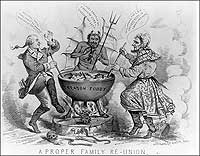
Arnold's treason created a timeless villain in the American imagination. This 1865 political cartoon shows Arnold keeping company with the devil and Jefferson Davis.
This image has been substituted for one that accompanied this article in the summer, 2001 print issue of the Colonial Williamsburg Journal.
He dueled with a lord who insulted his honor, and badgered Clinton for a written avowal that his treason had stemmed from conviction. His bold actions won him friends and prompted Prime Minister William Pitt, the Younger, to review Arnold's claims for restitution, but nothing ever came of it.
When the Reign of Terror gripped France, Arnold, 52, agitated for a command in the approaching war. None forthcoming, he equipped and armed his own ship and went privateering in the West Indies throughout 1794 and 1795. Again, he profited from war.
No places on earth changed hands faster than the islands of the Caribbean. It was not unheard of for men to sally into a friendly port and find it fallen to the enemy. Arnold, who had done business on Guadeloupe for thirty-five years, was unaware when he sailed into the harbor to buy sugar that the French had just reoccupied the place.
Too late to flee, Arnold tried to bluff his way out by claiming American citizenship. He chose the alias John Anderson, the name Major André gave the New York militiamen. The French surmised Arnold was a British spy and confined him to a prison ship until they could hang him.
A few coins hidden on his person bought the information that a British fleet had arrived to blockade the harbor. Bribing guards, Arnold squeezed out of a cabin window at night and slid down a rope to a flimsy raft. Paddling with his hands, he made his way to a small boat and began rowing furiously toward a British man-of-war at the harbor's mouth. A guard boat chased him, but Arnold lost it in the dark.
He remained aboard the man-of-war for a year as a volunteer quartermaster and organized planters and merchants into a militia. So impressed were the locals with his tireless work that when he made for England in 1795 they sent a resolution to London pleading that he be returned as commander of a relief expedition.
Arnold was a hero again, rejuvenated, vindicated, and honored to be considered for a command. Instead, the ministry rewarded him with more than thirteen thousand more acres of Canadian land.
"I have, thank God, got him safe at home," wrote his wife. He did not intend to stay. During the next four years, he repeatedly attempted to obtain a command in the West Indies. His health failed, as did his wife's. He was no longer able to captain his privateers. He walked with a cane. His debts grew.
England was too preoccupied with Napoleon in 1801to much remark Arnold's death. The newspapers and magazines referred briefly to him as "a person much noticed during the American War," but Arnold was yesterday's news. Four state carriages and seven mourning coaches filled with notables attended his funeral, but it was not a military service he would have liked.
Three years later, Peggy died of cancer. A better money manager than he, she settled the family's debts and saw her children educated and established.
In the end, England benefited from Arnold's defection in an unexpected way. With two wives, he had seven sons who lived to adulthood. All served as British army officers. His eldest died fighting in Jamaica; two served in the cavalry in India—one under Cornwallis; another became a captain. James, a middle son, became a lieutenant general and a knight. One of Arnold's grandsons died in battle in the Crimea, and a great-grandson fought in World War I as a major general.
All served their country with honor.
